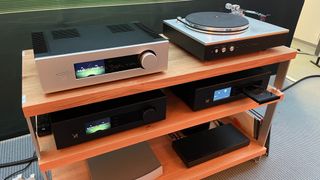Whether it comes to us without warning as an unshakeable itch over a tormenting week or, less randomly, during a visit to a friend’s house which has been newly furnished with an amplifier costing twice the price of your own, we hi-fi hobbyists are prone to ‘upgradeitis’ just as much as the common cold. The nail a former What Hi-Fi? Editor hit directly on the head: “We're known for our inability to buy a system, set it up and listen to music – we have to tweak this, adjust that and constantly buy new bits and bobs.” It’s hardly a reputation we, as a collective, can refute. In my years of daily, 9-5 access to state-of-the-art testing facilities, I still fully exploited my opportunity to borrow (always borrow!) kit to take home and swap in for something positively ancient… or, more often than not, six months old. And, admittedly, not always because I thought it would bring real improvements to my system; sometimes just because I could and knew it would temporarily relieve the itch.
OK, so I could do this easily and free of charge – my job is an enabler. Thinking about it, upgradeitis is an occupational hazard and perhaps I should get some sort of workers' compensation for psychological suffering. But anyone can replace components in their system as often as they like if they have the cash and medical condition itch to. I hear a cure isn’t a World Health Organization priority, so the best we can do is to try to keep it under control.
Get to know your system inside out
Before committing to an upgrade, not least if you’ve identified a weakness in your system, get to know your system inside and out and make sure it’s already the best it can be. We at What Hi-Fi? have written catalogues of advice on how to get optimal performance from your speakers, amplifiers, turntable etc – so check you’ve done your due diligence there. Are you using good-quality interconnects and speaker cables, and are all the connections squeaky clean and tight? Can you better position your speakers or decouple anything better using isolation materials?
Such tweaks aren’t always going to make a world of difference, but you might be surprised how much impact they can make, and there’s no harm in trying to improve a problem inexpensively or for free before splashing the cash on a bigger upgrade.
Don’t upgrade for the sake of it
Don’t upgrade just because ‘it’s time’. if you’re upgrading twice a year because you think that sounds about right, then congratulations on having the disposable income to do so. But hi-fi isn’t a car; it doesn’t have kilometres on the clock. Unless it malfunctions or something software-related renders it defunct for you, hi-fi doesn’t need upgrading. Fair enough if you’ve identified an area of weakness you want to strengthen – a tonal imbalance, for example. But your reason to upgrade should be, in a nutshell, to make a real discernible improvement to the sound. To how well it plays music. Upgrading for the sake of it is, as that same editor penned better than I could, “the first step on the path to hi-fi misery”. And while I recognise the appeal in accumulating equipment for avid collectors, that rather makes the whole thing about hi-fi more than about music, somewhat missing the point of it, don’t you think?
Do listen to lots of kit…
And it’s an improvement you should seek; not just a difference. The more kit you listen to, whether that’s at hi-fi shows or your local dealership(s) or to stuff your mates own, the more you’ll be able to discern real improvements from mere differences in sound; differences that can sometimes present themselves as seductive at first but aren’t necessarily better than what you have.
There’s a psychology to be aware of. Change anything in your system, whether that’s introducing a whole new component or changing the positioning of something, and you’re likely going to hear a difference. To borrow more words of wisdom, “often you can put things back the way they were and the sound will seem to get better again!” Ultimately, take the time to examine whether it’s better or just different.
Only by listening to lots of equipment and racking up experience can you make meaningful comparisons. After all, that's how we do it! Can you hear more of (as in, detail in) your music? Does it better communicate the mood of it and elicit emotion from you?
You should try to identify the particular aspects of your system’s sound that you want to improve, too, rather than go for a vague ‘better performance’ ideal which runs the risk of losing the elements you liked in the first place.
When you’re satisfied in knowing your next move, try to buy your upgrade from a dealer with an exchange plan, just in case it doesn't work as well with your system as you thought it might, or you simply find you've made a terrible mistake (it happens).
… and then don’t (sorry)
Once you’ve spent the time and consideration building a system you’re happy with and enjoy listening to music through, forget everyone else’s hardware and don’t always go looking for the next thing. A big upgrade – say, a core component jumping up a price bracket or two – every few years will likely be more worthwhile than a couple of modest upgrades along the way, too, and you’ll save the money and faff and likely enjoy hearing the bigger-step improvement.
Avoid getting sucked into the ‘what ifs’ and 'perhaps I shoulds' of new equipment or accessories, and live with what you’ve bought. Concentrate on the music and show upgradeitis who’s boss, otherwise you’re simply indulging in hi-fi masochism. As a (different) former colleague wrote, if you’re more into hi-fi than music, that's a problem.
Upgrade elsewhere – music!
Recently I came home from two days of listening to music at a hi-fi show, desperate to listen to my own set-up. The irony is that it’s inferior (and costs lots less) to most of the systems I heard. But I was desperate to play some of the music I had heard for the first time and liked and jotted down in my notebook (Eagles’ Hotel California... just kidding. Anyma’s Sentient was one, though, if you were wondering; Doug MacLeod’s My Black Pony was another).
Keep upgradeitis at bay by listening to more music. Instead of being down that you’ve heard your favourite Diana Krall track better through another system, listen to something new. Use a streaming service’s artist radio feature, or tune into a playlist curated by your favourite artists, record stores or hi-fi magazines, or play a few records from a genre crate you wouldn’t normally dig through at a record store. Do it all! The world’s music catalogue is all there, at our fingertips, ready to be explored, and nothing beats the thrill of discovering a new artist you like. Not even hearing a new amplifier that sounds that little bit better than your last.
MORE:
8 ways to make your hi-fi sound better for free

